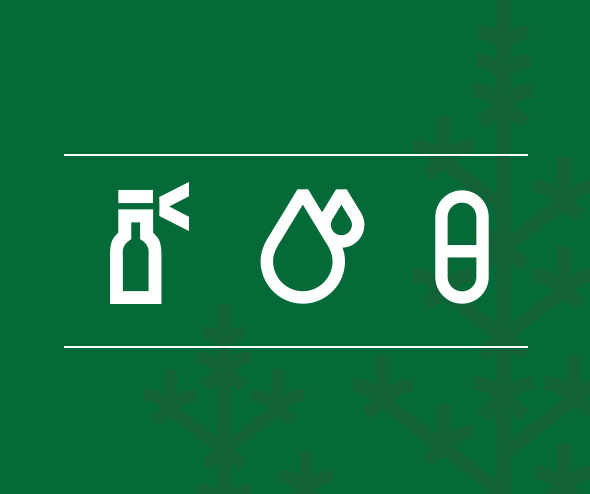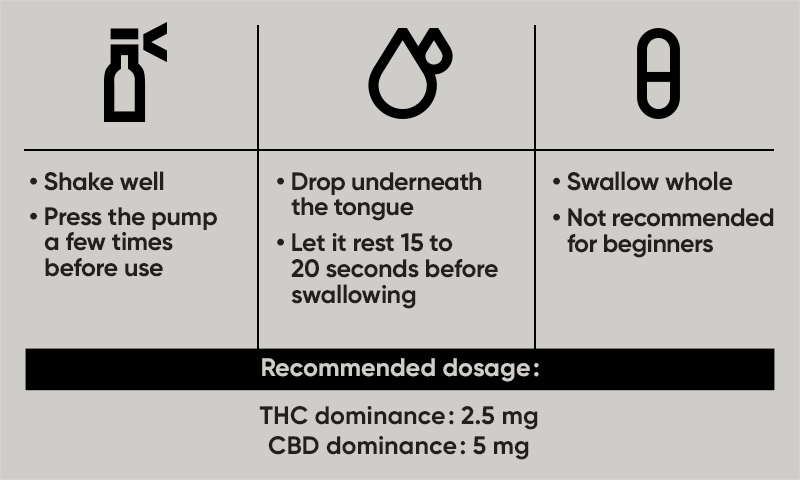How to consume cannabis oil safely
Are you curious about cannabis oil and the different forms available at the SQDC? Oil is not as well known as inhaled products (think dried flowers and ground cannabis). Québécois therefore still have lots of questions about its use.
Whether by spray, sublingual drops, or capsules, we have tips on using cannabis oil, and explain the benefits of each format so you can make an informed choice.

How is cannabis oil made?
Before going any further, let’s refresh your memory with regard to how this oil is made. It is a neutral oil (often made with two specific fatty acids found in coconut oil) to which cannabis flower extracts are added. The varieties, their genetics, and the extraction processes vary from one producer to the next, which explains the different concentrations.
Cannabis oil comes in various forms, the most common being sublingual drops, sprays, and capsules. That’s right: The oil doesn’t change; how you consume it does.
What’s an oral spray?
Think oral sprays and vaporizers are one and the same? Think again. In the world of cannabis, oral sprays are used to consume oil orally, by spraying into the mouth. Vaporizers, on the other hand, are used to inhale cannabis flowers or extracts.
To use the oral spray, tear off the security seal and twist the mechanism to open. We suggest shaking the spray can lightly before using to mix its content. Next, push on the pump a few times to activate the spray and help it reach its full capacity. This will make it easier to calculate the right dosage.
Speaking of dosage, you should know that all oral sprays have a jet of 0.1 mL per spray, or activation. You must then use the information appearing on the bottle itself to calculate the appropriate number of activations. Inexperienced users should only use one activation (or spray).
Many people appreciate the spray because it is convenient, safe, and easy to carry.
What is sublingual oil?
Just like the name suggests, the sublingual form consists of drops that go under the tongue, using a graduated pipette. Once the appropriate dosage has been measured and applied, we suggest letting it take action underneath the tongue for 15 to 20 seconds before swallowing; this will allow better absorption by the mucous membranes and blood vessels there.
This method requires particular attention, as you need to carefully measure the dosage using the pipette, as opposed to capsules and sprays, where the dose is predetermined. Nevertheless, the sublingual oil offers some flexibility with regard to amount, and it’s fairly easy to use.
What are capsules?
Oil can also be turned into capsules to be swallowed whole, without chewing or dissolving. With this format, the doses have already been measured. For cannabis oil first-timers, our experts do not recommend this format, as the doses are not entirely to your discretion.
What are the effects of cannabis oil once ingested?
Whether you opt for sublingual drops, sprays, or capsules, the effects of ingesting oil are similar, but different from those of inhaled cannabis. When ingested, the oil passes through the liver. Because this process is longer, the effects can take anywhere from 30 minutes to two hours to appear. They generally last six to eight hours or more, depending on the amount consumed.
Effects vary greatly from one person to the other and can prove to be unpleasant if the amount consumed is too high. This is why it’s important to follow the recommended doses, especially the first time. To learn more about product concentration, which will help you determine how much you can consume safely, you can read our Guide to the New THC and CBD Content Units.
Regardless of your consumption type, keep in mind that having all the information is of utmost importance, and feel free to ask questions and consume safely!
Quick reminder

Here is a series of Q and As
1. How much oil should I consume the first time?
For THC oil, the recommended dosage is 2.5 mg. As for CBD oil, we recommend starting with 5 mg. It’s always best to start with a smaller dose and go progressively to reach the dosage that’s right for you.
2. If I already smoke cannabis on a regular basis, can I take a greater quantity than what is recommended?
As the effects of inhaled cannabis are different from those of ingested cannabis, we strongly recommend sticking to the recommended dosage, even if you’re an experienced user.
3. Can I use cannabis oil to cook?
It is not recommended to use capsule, spray, and sublingual drop cannabis oil for cooking, as these were not designed for this purpose. You can, however, add some to your dish once it is ready, by spraying it over the dish, for example, always based on the appropriate dosage for you.
Other subjects of interest
Types of product
The SQDC sells a range of quality cannabis products with a lower risk level, all of which have been authorized by Health Canada.
The effects
Relaxing, stimulating and mood-altering: cannabis can have effects that are pleasant or undesirable. Learn what causes the effects and determines how intense they are and how long they last.
Assistance resources
Are you or a friend or family member dealing with a problem related to cannabis use? Several assistance resources are available to you. Take advantage of them!
